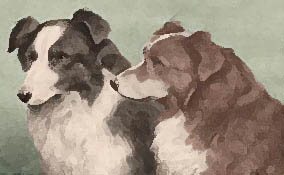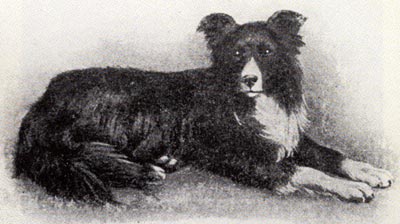

![]()
ADELAIDE L. J. GOSSET
1855-1936

Above, Kep (number 13 in the ISDS Stud Book), also known as "Auld Kep", born 1901,
who belonged to James Scott of Troneyhill, Ancrum, near Jedburgh, Scotland
(ironically, see The Border Collie in America for more information about James Scott).
Kep and Scott won the ISDS International Supreme Championship in 1908 and 1909.
(Kep's photo was used on the title page of Adelaide Gosset's Shepherds of Britain.)
(For some of the information in this article, thanks go to Andrew Hall of Bishop Wilton, Yorkshire, the editor of International Sheepdog News (the ISDS publication);
and to Sally Douglas of Melbourne, Australia, a seemingly tireless researcher, for which I am forever grateful. )
[Very little is known about Adelaide Gosset. There are no biographies written about her that we know of. So, I will start this article with a request: if you have any information about the author/editor of Shepherds of Britain, no matter how small or insignificant it seems to you, please send it to me at carole@woolgather.org.]
The Gosset family are thought to have come over from Norway during one of the Viking raids on France, and became feudal lords in Normandy. After the Revocation of the Edict of Nantes (1685), Jean Gosset, a Huguenot, fled from Normandy and settled in Jersey Island, one of the Channel Islands off the Coast of Normandy, a Crown dependency of Britain rather than France. The family exists in various branches in Jersey and England, and elsewhere in the world today. [Information gleaned from The Descendants of Milton Gossett website; The National Archives (UK); Burke's The Landed Gentry; the Channel Islands Genealogy website; and Wikipedia.]
In 1793, Grace, the eighth daughter of Admiral Thomas Frankland, a descendant of Oliver Cromwell, married Matthew Gosset Esq., Viscount of Jersey. They had five children, the fifth of whom was Arthur Gosset, a retired Major of Artillery, and a Magistrate for Kent. In 1834, Arthur married Augusta Morgan. Adelaide Louisa Julia Gosset was born in 1855, one of twelve children. [Information gleaned from The House of Cromwell and the Story of Dunkirk by James Waylen, Chapman and Hall, Ltd, London, 1880.]
Even Adelaide's birth date is suspect. Her place of birth was Eltham in Kent (near Greenwich). Thereafter, she appears in the 1861 English Census (at approximately 7 years old) as residing somewhere in Kent; the 1871 Census (age 17) listed as the daughter of the head of household in Richmond, Surrey; the 1881 Census (age 27) as still living in the household of her parents, Arthur (then aged 80) and Augusta (then aged 70) in the Surrey residence; in the 1891 English Census (at about 37 years old) as residing somewhere in Kent; and in the 1901 English Census (at about 47 years old), living in Kensington, London. The West Sussex Record Office has her listed as living in Chichester as well, probably at the end of her life, where she died at age 81.
We can perhaps assume that she never married, that she had a good education, despite being a woman and coming from a large family with four brothers, because by 1893, possibly earlier, she began writing books as an author and editor. Most of these were of a morally uplifting nature with titles like Lullabies & Baby Songs: A Posy for Mothers; The Marvellous Wisdom and Quaint Conceits of Thomal Fuller (a 17th century churchman and historian); Beautiful Days: Thoughts for Each Day of the Month, From the Writings of J. R. Miller (a 19th century popular Christian author); and so on. She also edited collections of songs and/or poetry, for example Lullabies of the Four Nations: A Coronal of Song with Renderings from the Welsh and Gaelic and Shepherd Songs of Elizabethan England.
It is unclear whether Gosset worked for a publisher or prepared these on her own for publication, as they were distributed by a variety of publishers. However, many if not all of them were issued and re-issued again and again, some editions coming out close on the heels of the others, so it is hard to tell which were the originals.
The book that interests us most as sheepdog enthusiasts is of course Shepherds of Britain or Scenes from Shepherd Life Past and Present (1911, Constable & Company, London). It is a collection of essays and articles by various authors of the day, quotes from earlier writers, and filled out with additions written by Gosset herself. Gosset refers to herself as "the author" or "this author", but she is indeed "merely" the editor. However, I can attest to the fact that an editor's job is extremely difficult, and requires skills in research, writing, editing (a skill in its own right), and organization, and Gosset seems to have had these skills. In her preface, Gosset states that:
It is now many hundred years since sheep-farming became one of the first industries of Britain, and it is therefore surprising that no book at all adequately descriptive of the shepherds of this country and their shepherding has yet been published. The reason for this is perhaps the great scope of the subject, and the innumerable points of interest upon which such a book must necessarily touch, if only to set down and note the changes which even in this most conservative calling--the most unchanging of all our industries--have to be recorded. That the ways of shepherds and the charms of their life do interest us, I have ample evidence. For since the announcement was made of the preparation of this volume, I have received more than two hundred letter on the subject from correspondents in various parts of the country.
Some of the authors represented are well-known: W. H. Hudson (a late 19th, early 20th century naturalist and writer), H. Rider Haggard (a late 19th and early 20th century prolific writer of adventure novels); Ralph Fleesh (an Irish journalist who wrote of, among other things, sheepdog trials, and contributed several articles to Shepherds of Britain, including one on Auld Kep); and James Hogg (no need of an introduction there). Others, are less well-known.
There is a large section devoted to "The Shepherd and his Dog", though dogs are mentioned elsewhere throughout the book. Most are short articles. Here is a paragraph from the section "Shepherd and Flock", written by Richard Jefferies (1848-1887), a 19th century naturalist and nature writer, known for his essays on rural English life:
Another of Gosset's books worth mentioning is Shepherd Songs of Elizabethan England: Workaday Shepherds, Holiday Shepherds, Shepherds 'Passionate'; A Pastoral Garland (1912, Constable and Company Ltd., London). In her preface, Gosset quotes James Gardner, a well-known shepherd, who Gosset obviously respected. (There are three articles on Gardner in Shepherds of Britain, one of which includes descriptions of his interaction with his dogs.)VASTNESS OF SOUTHDOWN SHEEP-WALKS
by Richard Jefferies, 1887The shepherd came down the hill carrying his greatcoat slung at his back upon his crook, and balanced only by the long handle projecting in front. His dog was a cross with a collie: the old sheep-dogs were shaggier and darker; most sheep-dogs now used were crossed with the collie, either with Scotch or French, and were very fast--too fast in some respects. He was careful not to send them much after the flock, especially after feeding, when, in his own words, "the sheep had best walk slow then, like folk"--like human beings, who are not to be hastened after a meal. If he wished his dog to fetch the flock, he pointed his arm in the direction he wished the dog to go, and said, "Put her back." Often it was to keep the sheep out of the turnips or wheat, there being no fences. But he made it a practice to walk himself on the side where the care was needed, so as not to employ the dog unless necessary.
...I have made no attempt whatever to compile a complete collection of pastoral songs of the Elizabethan period; but include chiefly those that refer to the shepherds' "trade" or that are irresistible on account of their melodious appeal. Mr. James Gardner (b. 1840, d. 1900) of all shepherds perhaps the best qualified to speak, once said, "A shepherd's life, properly understood, is the richest in the world;" and again, "A young shepherd's love-making is nature's purest poetry." The difference between the shepherd of the Elizabethan poets and that of the twentieth century may not be so great as we imagine...The poems she chose do not always mention the shepherd's dog, but some of them do, usually in a utilitarian context such as:
Surveying of my sheep, if ewe or wether look
As though it were a-miss or with my cur or crook
I take it, and when once I find what it doth ail,
It hardly hath that hurt, but that my skill can heal--Michael Drayton (1563-1631)
If I have to fault Gosset, it would be that she does not date the entries, and they cover a very wide period of time, because Queen Elizabeth I reigned for a very long time (1558-1603). There is, however, a "Glossary and Notes" at the back of the book that more than makes up for this ommission.
Both Shepherds of Britain and Shepherd Songs of Elizabethan England are occasionally available in their original editions via booksellers, though not cheaply. Shepherds of Britain can be had in modern "trade paperback" editions published by Kessinger, who specialize in reprints of rare and out-of-print/out-of-copyright books. Hopefully, at some later date, with your help, I will be able to add to this article on Adelaide L. J. Gosset.
Copyright 2008 by Carole L. Presberg
THE OTHER WEB PAGES WE MAINTAIN
These web pages are copyright ©2013
and maintained by webmeistress Carole Presberg
with technical help from webwizard David Presberg
ALL RIGHTS RESERVED
If you are interested in using ANY material on this website, you MUST first ask for permission.